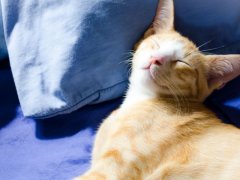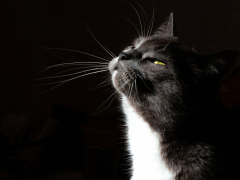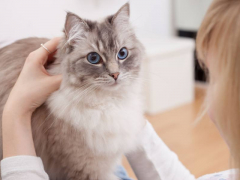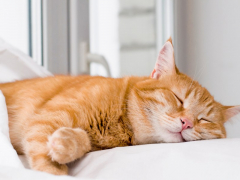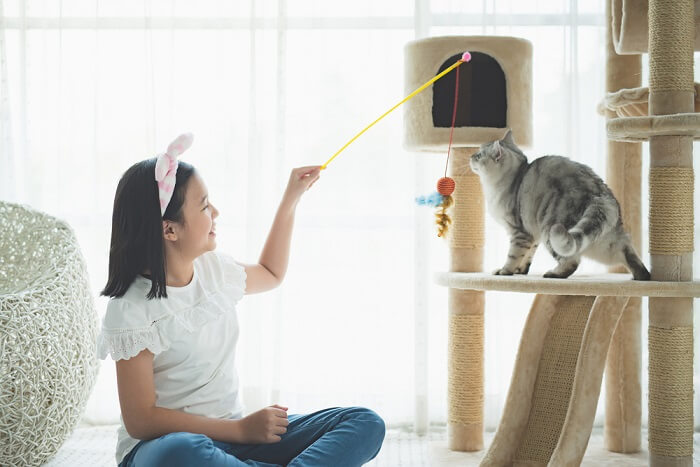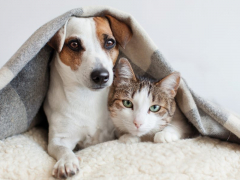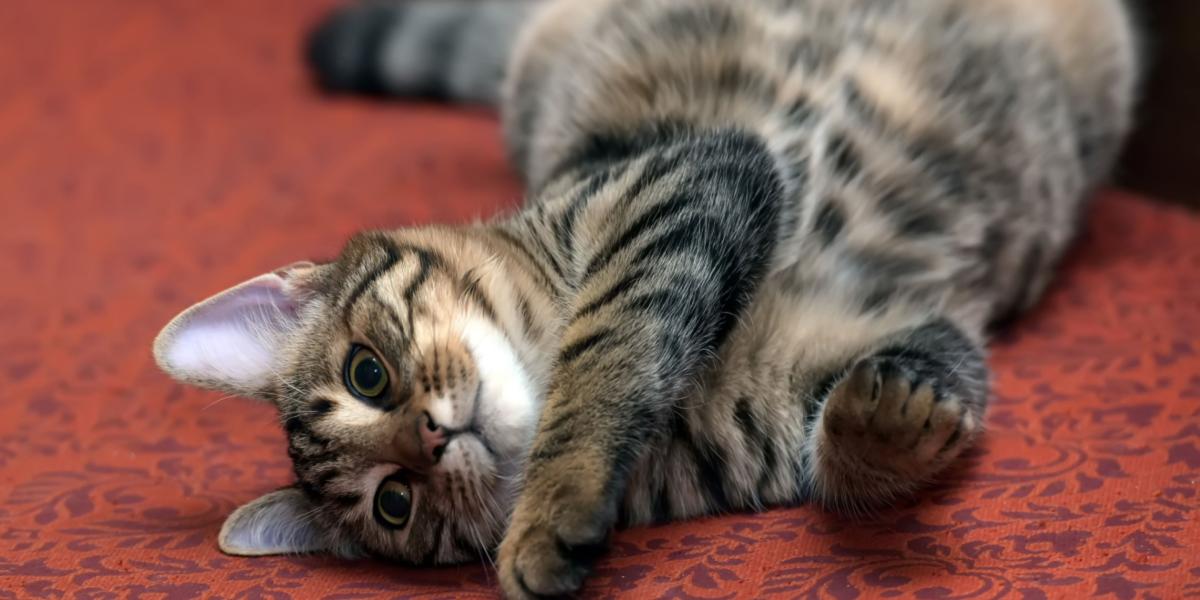
There’s nothing more adorable than when your cat greets you by rolling around on their back and showing you their fluffy belly. You might also observe your pet cat rolling on their back in other situations, such as when they’re outside, or when they’re nowhere near you or anyone else.
So why do cats roll around on their backs? In this article, we’ll take a closer look at some of the main reasons behind this common cat behavior.
1. She Has an Itch
The explanation for your cat rolling on their back once in a while could be as straightforward as that they have an itch that needs scratching. Or your cat could be trying to remove something from the fur on their back.
If your cat can’t reach the spot with their paws, then rolling the spine against the floor is a good way to alleviate that annoyance! Fleas commonly cause itchiness in cats so take your cat to the vet if they suddenly seems very itchy.
If your cat frequently rolls on their back, it could be that it initially started as a way of scratching themself but now your cat has learned that it gets them some attention! Or they could be rolling on their back for any number of other reasons.
2. They’re Stretching Their Muscles
Cats need a good stretch every now and then, just like us humans. You might notice that your cat rolls onto their back and stretches their full body out just after they have woken up from a nap.
Your cat might even roll around on their back a few times to wake themself up and get their body ready for action. If your cat is rolling on their back just after they have woken up, it’s best to leave them alone until they come to you for attention.
3. They Feel Safe With You
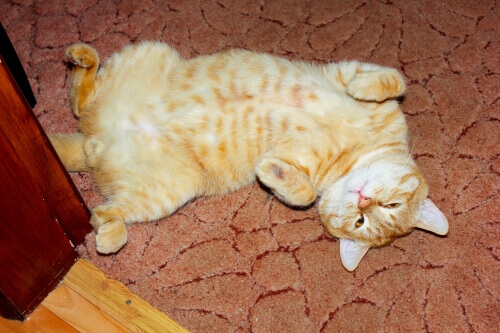
If your cat is rolling on their back just after they have woken up, it’s best to leave them alone until they come to you for attention.
Your cat is vulnerable when on their back with an exposed belly. A cat’s belly is a sensitive area and it is natural for them to try and protect it. If your cat greets you by rolling over and showing you their sensitive tummy, you should feel privileged. Your cat is showing you that they are completely relaxed around you and trust you to keep them safe.
4. They’re Attention-Seeking
Cats are intelligent, sometimes more intelligent than we as cat owners give them credit for, and it doesn’t take a kitty long to realize that by rolling on their back in front of you, you’re going to stop and give them some attention. Once this has happened a few times, your cat will learn that this is a sure-fire way to get your attention!
It can become routine with some felines, for example, your cat might always do this when you come home from work, or first thing in the morning just before feeding time. Cats take comfort from routine, so behaviors like this can quickly become a habit.
5. They Want To Play
This is closely linked to attention seeking but it could be that your cat is feeling playful and is trying to encourage you to play. Playing allows a cat to use their natural hunting instincts and will often mimic chasing and catching prey animals.
A cat that is feeling playful might wriggle about on their back, or swoosh from side to side, or even play with their own tail! If you are unsure, try offering your cat a small toy to bat around, or encourage them to chase a feather teaser toy.
If your cat is rolling on their back to seek your attention, you might also notice them purring while she does it, or repeatedly rubbing against your legs and feet. Spend some time stroking or playing with your cat when they do this and you’ll find it strengthens the bond between you even further.
6. They’re Marking Their Territory
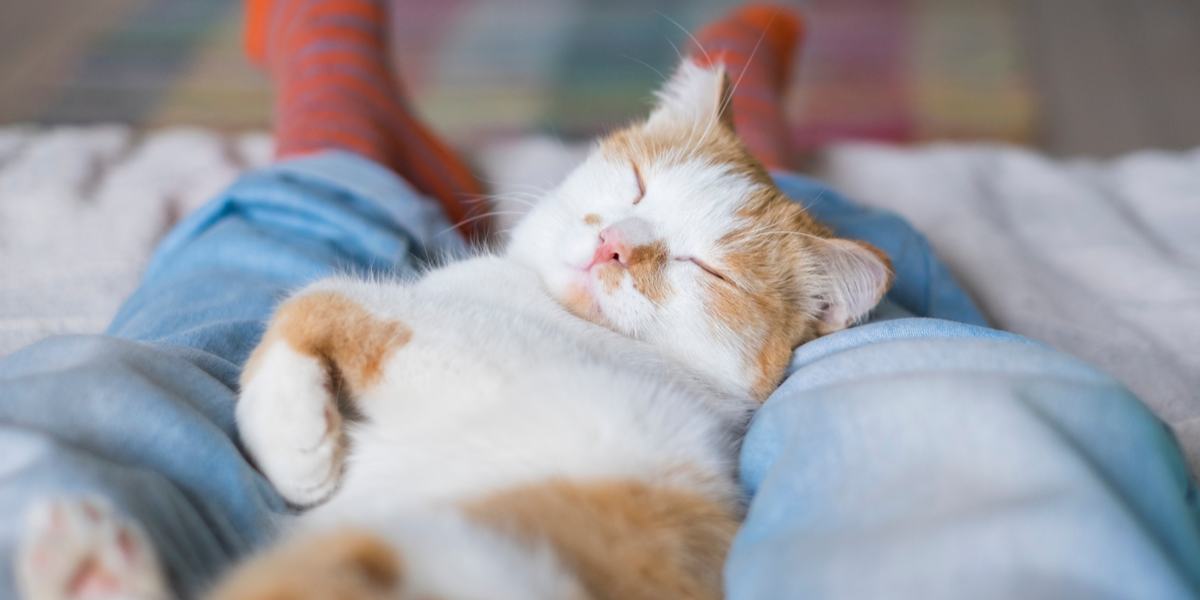
Cats take comfort from routine, so behaviors like this can quickly become a habit.
Cats have scent glands all over their bodies, which are used primarily for marking their territory and communicating with other cats. Rolling on their back spreads these scent pheromones around, signally to other neighborhood cats that your cat has been there.
Cats also mark their territory by rubbing their cheeks or their flanks along things in the environment. This is sending a signal to other cats to keep away as this territory has already been claimed.
Some domestic cats also mark their territory by scratching or even spraying urine. This isn’t so much of a problem if it happens outdoors, but is obviously undesirable if your cat is marking your house in this way. It can sometimes indicate a behavioral issue if your cat has suddenly started spraying urine around your house so speak to your veterinarian for further advice on how to get them to stop.
7. She’s in Heat
Female cats will often roll around on the ground when they’re on heat or after mating. It’s a behavior that’s probably triggered by hormones and is a female cat’s way of scent marking her territory with pheromones (chemical messengers) that signal to a male cat that she’s ready to be mated. Humans cannot smell these pheromones but male cats can detect them from great distances away!
When a female cat rolls on her back after mating, it could be that she is trying to remove the scent of the male cat that’s just mated her before finding another male cat to mate with. Multiple matings increase a cat’s chance of successful conception.
If you do not want kittens, then take your cat to the veterinarian to get her spayed as soon as possible. Spaying your female cat will also prevent her from coming into heat and can help eliminate annoying behaviors, such as scent marking and excessive vocalization when she’s in heat.
8. They’re Reacting To Catnip
If you’ve ever given your cat some catnip or a catnip toy, then you might have seen the entertaining response that ensues. Catnip induces a sense of euphoria that will often cause cats to roll about on their backs, start drooling, or even have a bout of hyperactivity. All cats react slightly differently and not all cats are sensitive to the effects of catnip. Why don’t you try giving your cat some and seeing what happens?
9. They’re Preparing To Defend Themself
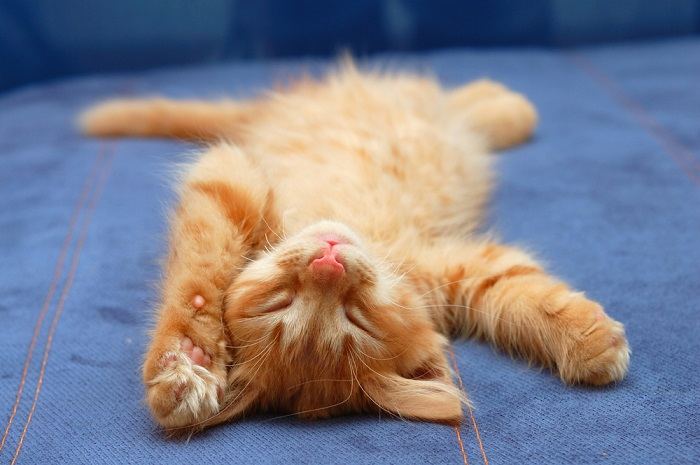
Some cats that are particularly frightened at the vets might do this with people to try and get them to back off!
Look at the context of the situation. If your cat is feeling threatened by another predator, they might roll on their back with their claws extended and their teeth bared. They might even be hissing. This is an act of aggression rather than a demonstration of trust.
Some cats that are particularly frightened at the vets might do this with people to try and get them to back off! This type of roll onto the back will appear very different from the one your cat gives you when they are pleased to see you!
Should I Stroke My Cat’s Tummy When They Roll On Their Back?
Most cats don’t enjoy their tummy being touched. Even if your cat rolls onto their back and shows you their belly, this is rarely an invitation to stroke it, and be aware that you might get scratched or bitten if you try!
There are a few pet cats that will allow you to stroke their belly for short periods of time, but even these cats are probably tolerating it rather than actually enjoying it. If your cat does enjoy a belly rub, you should feel privileged as this is a demonstration that they trust you completely.
What if My Cat Doesn’t Roll On Their Back?
Some domestic cats will roll on their back more frequently than others. If you don’t notice that your cat rolls onto their back when they sees you, it’s probably just that they express themself in a different way, such as rubbing around your legs, giving you a head butt, or standing with their back arched.
Cats are all individuals and just like people, they can have very different personality traits and behaviors. If you have an old cat that used to roll on their back but now doesn’t, this could be one of the symptoms of arthritis so take them to your veterinarian for a checkup.
Summary
As you can see, there are many reasons that your cat might roll around on her back. Look at the context of the situation and pay attention to when and where your cat is rolling on their back and it’ll give you the clues you need to work out why they’re doing it. As cute and tempting as that fluffy belly might look though, remember the golden rule—you can look but don’t touch!
Also Read: Why Does My Cat Bite Me When I Pet Her?
Frequently Asked Questions
Why do cats roll on their back when they see you?
One of the most common reasons is that they are pleased to see you! Showing you their belly means that they trust you and feel safe in your company. Your cat might also be feeling playful and trying to encourage you to interact with them.
Do cats like their belly being rubbed?
Most cats do not like their belly being rubbed and may scratch or bite you if you try to stroke it. A cat’s belly is a very sensitive area and it is natural for them to try and protect it. Some cats might tolerate their belly being rubbed for a short while but very few cats actually enjoy it.
What does it mean when a cat lets you rub her belly?
If your cat lets you rub their belly, then it’s a sign that they trust you completely. A cat’s belly is a very sensitive area and it is natural for them to try and protect it. Some cats might tolerate their belly being rubbed for a short while and when they’ve had enough they might bat you away or try and bite your hand.
